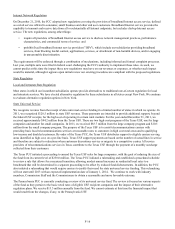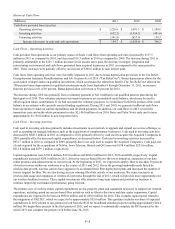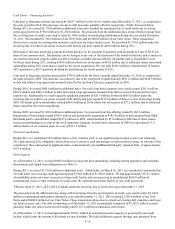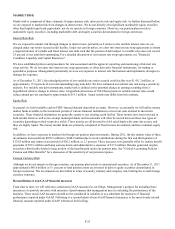Windstream 2011 Annual Report Download - page 131
Download and view the complete annual report
Please find page 131 of the 2011 Windstream annual report below. You can navigate through the pages in the report by either clicking on the pages listed below, or by using the keyword search tool below to find specific information within the annual report.
F-23
MARKET RISK
Market risk is comprised of three elements: foreign currency risk, interest rate risk and equity risk. As further discussed below,
we are exposed to market risk from changes in interest rates. We do not directly own significant marketable equity securities
other than highly liquid cash equivalents, nor do we operate in foreign countries. However, our pension plan invests in
marketable equity securities, including marketable debt and equity securities denominated in foreign currencies.
Interest Rate Risk
We are exposed to market risk through changes in interest rates, primarily as it relates to the variable interest rates we are
charged under our senior secured credit facility. Under our current policy, we enter into interest rate swap agreements to obtain
a targeted mixture of variable and fixed interest rate debt such that the portion of debt subject to variable rates does not exceed
25 percent of our total debt outstanding. For a detailed discussion of our interest rate swap agreements, see "Financial
Condition, Liquidity and Capital Resources".
We have established policies and procedures for risk assessment and the approval, reporting and monitoring of interest rate
swap activity. We do not enter into interest rate swap agreements, or other derivative financial instruments, for trading or
speculative purposes. Management periodically reviews our exposure to interest rate fluctuations and implements strategies to
manage the exposure.
As of December 31, 2011, the unhedged portion of our variable rate senior secured credit facility was $1,411.2 million, or
approximately 15.8 percent of our total outstanding long-term debt. We have estimated our interest rate risk using a sensitivity
analysis. For variable rate debt instruments, market risk is defined as the potential change in earnings resulting from a
hypothetical adverse change in interest rates. A hypothetical increase of 100.0 basis points in variable interest rates would
reduce annual pre-tax earnings by approximately $14.1 million. Actual results may differ from this estimate.
Equity Risk
In general, we hold available cash in FDIC-insured demand depository accounts. However, occasionally we will utilize money
market funds available in the investment portals of various financial institutions to invest our cash on hand in short-term
securities. These financial institutions are generally a party to our existing credit facility. These monies have been invested in
both taxable funds as well as tax-exempt municipal funds, and investments will often be moved between these two types of
securities depending on their respective yields. These monies are all invested in AAA rated funds with same day access, and
thus are highly liquid. The money market funds are primarily comprised of fixed income investments and have minimal equity
risk.
In addition, we have exposure to market risk through our pension plan investments. During 2011, the fair market value of these
investments increased from $870.5 million to $948.9 million due to stock contributions during the first and third quarters of
$135.8 million and return on assets held of $20.2 million, or 2.3 percent. These increases were partially offset by routine benefit
payments of $59.1 million and lump sum payments and administrative expenses of $17.6 million. Returns generated on plan
assets have historically funded a large portion of the benefits paid under our pension plan. See "Critical Accounting Policies -
Pension and Other Benefits" for a discussion of the sensitivity of our pension expense.
Foreign Currency Risk
Although we do not operate in foreign countries, our pension plan invests in international securities. As of December 31, 2011
approximately $86.0 million or 9.1 percent of total pension assets are invested in debt or equity securities denominated in
foreign currencies. The investments are diversified in terms of country, industry and company risk, limiting the overall foreign
currency exposure.
Reconciliation of non-GAAP financial measures
From time to time, we will reference certain non-GAAP measures in our filings. Management’s purpose for including these
measures is to provide investors with measures of performance that management uses in evaluating the performance of the
business. These non-GAAP measures should not be considered in isolation or as a substitute for measures of financial
performance reported under GAAP. Following is a reconciliation of non-GAAP financial measures to the most closely related
financial measure reported under GAAP referenced in this filing.
























